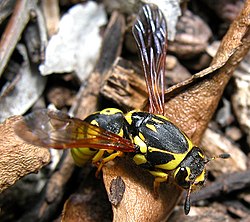| Pseudomasaris vespoides | |
|---|---|
 | |
| Scientific classification | |
| Kingdom: | Animalia |
| Phylum: | Arthropoda |
| Class: | Insecta |
| Order: | Hymenoptera |
| Family: | Vespidae |
| Genus: | Pseudomasaris |
| Species: | P. vespoides |
| Binomial name | |
| Pseudomasaris vespoides (Cresson, 1863) | |
Pseudomasaris vespoides is a species of pollen wasp in the family Vespidae. [1] [2] [3] This species can be found in the western United States as well as Baja California. [4] The species specializes in collecting pollen from penstemon flowers. [5]